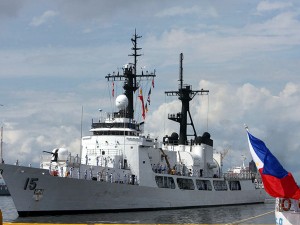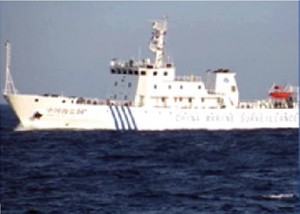
IMPASSE AT HIGH SEAS The BRP Gregorio Del Pilar, the country’s biggest warship, figures in a tense standoff with Chinese surveillance ships at the Scarborough Shoal. EDWIN BACASMAS
President Benigno Aquino III said Wednesday he wanted a peaceful resolution of the ongoing standoff between a Philippine warship and two Chinese vessels in the Scarborough Shoal, but made it clear that the country’s sovereignty over the area must prevail.
The President was told about the incident on Tuesday night and he promptly met Defense Secretary Voltaire Gazmin and military officials, his spokesperson, Edwin Lacierda, said.
Speaking to reporters after he accepted an honorary doctorate from Centro Escolar University at Manila Hotel, Mr. Aquino expressed hopes officials in the Department of Foreign Affairs (DFA) would resolve the impasse in talks with their counterparts in Beijing.
The Philippines said the standoff began on Sunday when its Navy tried to detain Chinese boats fishing in its waters but were stopped by two Chinese surveillance craft. The Chinese Embassy accused the Philippine warship of harassing the fishermen and called for it to leave Chinese territory.
The President said that he had been in contact with Chinese Ambassador Ma Keqing and that on Wednesday he asked Foreign Secretary Albert del Rosario to continue the talks with Ma “so that our position on this issue would be made clear.”
“What is important here is that we take care of our sovereignty. We cannot give [Scarborough Shoal] away and we cannot depend on others but ourselves,” Mr. Aquino said. Still, he said the rules of engagement he emphasized to the military were “to ensure no violence will happen there.”
The President said that “had the situation not been tense, maybe we will find it funny” as he explained China had flung back the violations that Philippine officials told them it had committed by its intrusion in the Shoal to the Philippines.
He said this was what Chinese officials told the Philippine charge d’affaires when Beijing summoned him over the incident.
Seeking diplomatic solution
Mr. Aquino insisted Scarborough Shoal is “our sovereign territory” and that Philippine officials had merely asked Beijing why it had intruded in its territory.
“But their answer to our charge d’affaires—and the worst part is, they turned the tables on us—China is claiming Scarborough Shoal, that it was its indisputable territory and even protested the entry of our ship there. So in effect, it’s like we are both saying the same thing from a different point of view,” he said.
The President stressed that the Philippines and China are signatories to the UN Convention on the Law of the Sea, which specifies each country’s exclusive economic zones.

GOING ROGUE One of two Chinese surveillance ships which blocked the Philippine Navy from detaining the Chinese fishing vessels. PHOTO COURTESY OF DFA-PISU
“No one will surely benefit if there will be an eruption of violence there. So we are hoping (for a peaceful resolution),” the Chief Executive said.
Del Rosario said he and the Chinese ambassador reaffirmed their governments’ positions that the Scarborough Shoal was part of their own country’s territory and neither was ready to stand down.
“We have reached an impasse in terms of our positions. So, there’s a real challenge for us in terms of our agreement to keep on talking today and we resolved to seek a diplomatic solution to the issue,” he said. “Both of us are aware in a spirit of friendship and cooperation that tensions should not be increased, that we should work at keepin
g tensions down.”
PH to defend shoal
The South China Sea, which Manila calls the West Philippine Sea, is home to a myriad of competing territorial claims, most notably the Spratly Islands south of the shoal. The islandsare claimed by China, the Philippines, Vietnam, Brunei, Malaysia and Taiwan. The barren islands, reefs and coral outcrops are believed to be rich in oil and gas and the overlapping claims have long been feared as Asia’s next flashpoint for armed conflict.
Both China and the Philippines flexed their muscles on Wednesday. Del Rosario said he warned China’s ambassador that “if the Philippines is challenged, we are prepared to secure our sovereignty.”
A Philippine Navy surveillance plane on Sunday spotted eight Chinese fishing vessels anchored in a lagoon at Scarborough, the DFA said. That prompted the military to deploy its largest warship, the BRP Gregorio del Pilar, which was recently acquired from the United States.
Illegal fishing
GOTCHA! Filipino soldiers board a Chinese fishing vessel loaded with giant clam shells, corals and live sharks. CONTRIBUTED PHOTO FROM NOLCOM
On Tuesday, Filipino sailors from the warship boarded the Chinese vessels for an inspection, discovering large amounts of illegally collected coral, giant clams and live sharks inside the first boat. Del Rosario said the Chinese fishermen had been “engaged in illegal fishing and harvesting of endangered marine species.”
Two Chinese maritime surveillance ships later approached and positioned themselves between the Philippine warship and the Chinese fishing vessels “thus preventing the arrests of the erring Chinese fishermen,” the Philippine statement said.
The Chinese Embassy said the fishing boats had taken shelter from a storm in the lagoon, and that Philippine troops including some who were armed went into the lagoon and harassed the fishermen.
“Two Chinese marine surveillance ships are in this area fulfilling the duties of safeguarding Chinese maritime rights and interests,” it said in a statement.
It said the shoal “is an integral part of the Chinese territory and the waters around it the traditional fishing area for Chinese fishermen.”
‘Law is in our favor’
Lieutenant General Anthony Alcantara, chief of the Northern Luzon Command, said the Philippine Coast Guard would eventually take over from the Philippine Navy to “tone down” and handle the matter as a maritime police case.
Senator Panfilo Lacson supported the moves on the impasse. “We should enforce our own laws. No matter how weak we are as a nation compared to China, the law is in our favor,” he told reporters.
In 2011, the Philippines accused Chinese vessels of intruding into other parts of what it considers Philippine territory. China has regularly dismissed the protests, saying Beijing has indisputable sovereignty over those areas on historical grounds.
The United States has insisted it takes no sides in the territorial dispute but says it should be solved peacefully. China has balked at what it considered US interference in the region.
The disputes over the Spratlys have settled into an uneasy standoff since the last major clash involving China and Vietnam killed more than 70 Vietnamese sailors in 1988. With reports from Dona Z. Pazzibugan, Michael Lim Ubac and AP

